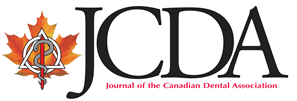 |
Current Issue | Subscriptions | ||||||
| Back Issues | Advertising | |||||||
| More Information | Classified Ads | |||||||
| For Authors | Continuing Education | |||||||
|
||||||||
 |
|
Have Dentin Adhesives Become Too Hydrophilic?FULL TEXT
• Franklin R. Tay, BDSc (Hons), FADM, PhD • A b s t r a c tWhen primers are mixed with adhesives in 2-step single-bottle adhesives and self-etching primers, the adhesives are more permeable to water and hence absorb more water over time than previous generations of adhesives. The most recent single-step self-etching adhesives are even more hydrophilic and hence more permeable to water derived from the underlying bonded dentin. This permeability can lead to a wide variety of seemingly unrelated problems, including incompatibility of chemically or dual-cured composites with simplified adhesives and expedited degradation of resin–dentin bonds.
MeSH Key Words: dental bonding; dentin-bonding agents/chemistry; permeability
Reply to this article | View replies [1]
|
|
|
Full text provided in PDF format |
|
| Mission Statement & Editor's Message |
Multimedia Centre |
Readership Survey Contact the Editor | Français |
|